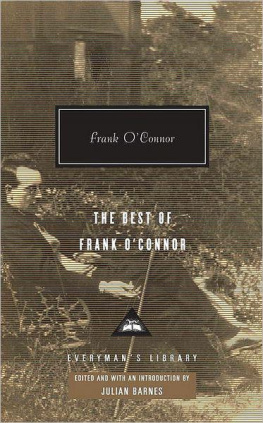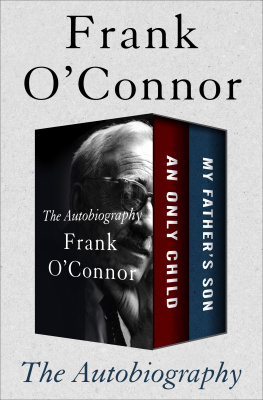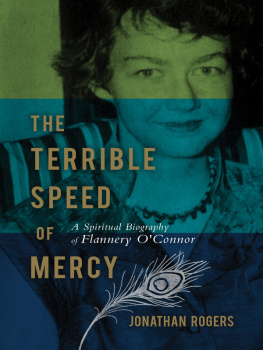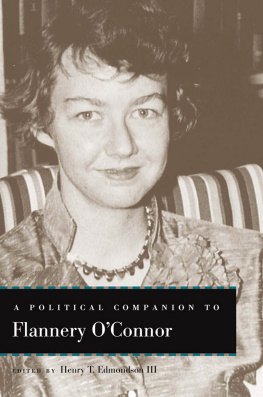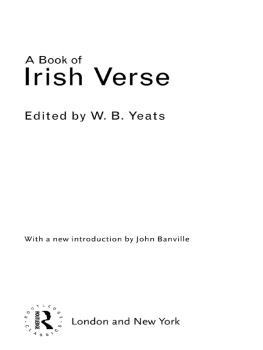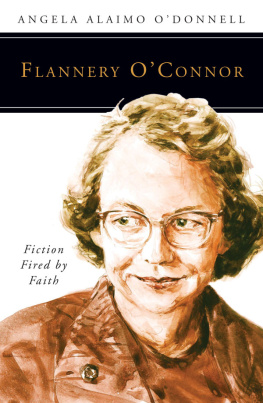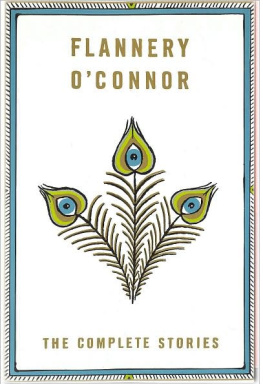ACKNOWLEDGMENT
I am very grateful to Harriet ODonovan Sheehy, Frank OConnors widow, for her forceful encouragement and assistance. She made many useful suggestions, pointed me towards obscure items, and at times stamped a tactful foot. Her selection would inevitably have been different; but she always allowed that the final choice, and responsibility, for this edition was mine.
J.B.
ABOUT THE EDITOR
JULIAN BARNESS novels include Flauberts Parrot, A History of the World in 10 Chapters and Arthur and George. He has also published collections of short stories and essays and, most recently, a memoir, Nothing to be Frightened of.
SELECT BIBLIOGRAPHY
SHORT STORIES
Guests of the Nation, London/New York, 1931.
Bones of Contention, New York, 1936; London, 1938.
Crab Apple Jelly, London/New York, 1944.
The Common Chord, London, 1947; New York, 1948.
Travellers Samples, London/New York, 1951.
Domestic Relations, London/New York, 1957.
The Stories of Frank OConnor, New York, 1952; London, 1953.
More Stories, New York, 1954.
Collection Two, London, 1964.
Collection Three, London, 1969.
The Cornet Player Who Betrayed Ireland, Dublin, 1981.
Collected Stories, New York, 1982.
My Oedipus Complex and Other Stories, London, 2005.
NOVELS
The Saint and Mary Kate, London/New York, 1936.
Dutch Interior, London/New York, 1940.
AUTOBIOGRAPHY
An Only Child, New York, 1961; London, 1962.
My Fathers Son, London, 1968; New York, 1969.
NON-FICTION
The Big Fellow: A Life of Michael Collins, London, 1937.
Irish Miles, London, 1947.
The Road to Stratford, London, 1948 (revised as Shakespeares Progress).
Leinster, Munster and Connaught, London, 1950.
The Mirror in the Roadway: A Study of the Modern Novel, New York, 1956; London, 1957.
The Lonely Voice: A Study of the Short Story, Cleveland, Ohio, 1962; London, 1963.
The Backward Look: A Survey of Irish Literature, London, 1967.
POETRY TRANSLATIONS FROM THE IRISH
Kings, Lords and Commons, New York, 1959; London, 1961.
The Little Monasteries, Dublin, 1963.
OTHER
The Happiness of Getting It Down Right: Letters of Frank OConnor andWilliam Maxwell, edited by Michael Steinman, New York, 1996.
A Frank OConnor Reader, edited by Michael Steinman, New York, 1994.
Writers at Work: The Paris Review Interviews, edited by Malcolm Cowley, New York, 1959.
Michael/Frank: Studies on Frank OConnor, edited by Maurice Sheehy, Dublin/London, 1969.
Frank OConnor at Work by Michael Steinman, New York, 1990.
Frank OConnor: New Perspectives, edited by Robert Evans and Richard Harp, West Cornwall, CT, 1998.
Frank OConnor: Critical Essays, edited by Hilary Lennon, Dublin, 2007.
There is also a website sponsored by University College, Cork:
www.frankoconnor.ucc.ie
GUESTS OF THE NATION
AT DUSK the big Englishman Belcher would shift his long legs out of the ashes and ask, Well, chums, what about it? and Noble or me would say, As you please, chum (for we had picked up some of their curious expressions), and the little Englishman Awkins would light the lamp and produce the cards. Sometimes Jeremiah Donovan would come up of an evening and supervise the play, and grow excited over Awkinss cards (which he always played badly), and shout at him as if he was one of our own, Ach, you divil you, why didnt you play the tray? But, ordinarily, Jeremiah was a sober and contented poor devil like the big Englishman Belcher, and was looked up to at all only because he was a fair hand at documents, though slow enough at these, I vow. He wore a small cloth hat and big gaiters over his long pants, and seldom did I perceive his hands outside the pockets of that pants. He reddened when you talked to him, tilting from toe to heel and back and looking down all the while at his big farmers feet. His uncommon broad accent was a great source of jest to me, I being from the town as you may recognize.
I couldnt at the time see the point of me and Noble being with Belcher and Awkins at all, for it was and is my fixed belief you could have planted that pair in any untended spot from this to Claregalway and theyd have stayed put and flourished like a native weed. I never seen in my short experience two men that took to the country as they did.
They were handed on to us by the Second Battalion to keep when the search for them became too hot, and Noble and myself, being young, took charge with a natural feeling of responsibility. But little Awkins made us look right fools when he displayed he knew the countryside as well as we did and something more. Youre the bloke they calls Bonaparte? he said to me. Well, Bonaparte, Mary Brigid HoConnell was arskin abaout you and said ow youd a pair of socks belonging to er young brother. For it seemed, as they explained it, that the Second used to have little evenings of their own, and some of the girls of the neighbourhood would turn in, and seeing they were such decent fellows, our lads couldnt well ignore the two Englishmen, but invited them in and were hail-fellow-well-met with them. Awkins told me he learned to dance The Walls of Limerick and The Siege of Ennis and The Waves of Tory in a night or two, though naturally he could not return the compliment, because our lads at that time did not dance foreign dances on principle.
So whatever privileges and favours Belcher and Awkins had with the Second they duly took with us, and after the first evening we gave up all pretence of keeping a close eye on their behaviour. Not that they could have got far, for they had a notable accent and wore khaki tunics and overcoats with civilian pants and boots. But its my belief they never had an idea of escaping and were quite contented with their lot.
Now, it was a treat to see how Belcher got off with the old woman of the house we were staying in. She was a great warrant to scold, and crotchety even with us, but before ever she had a chance of giving our guests, as I may call them, a lick of her tongue, Belcher had made her his friend for life. She was breaking sticks at the time, and Belcher, who hadnt been in the house for more than ten minutes, jumped up out of his seat and went across to her.
Allow me, madam, he says, smiling his queer little smile; please allow me, and takes the hatchet from her hand. She was struck too parlatic to speak, and ever after Belcher would be at her heels carrying a bucket, or basket, or load of turf, as the case might be. As Noble wittily remarked, he got into looking before she leapt, and hot water or any little thing she wanted Belcher would have it ready for her. For such a huge man (and though I am five foot ten myself I had to look up to him) he had an uncommon shortness or should I say lack of speech. It took us some time to get used to him walking in and out like a ghost, without a syllable out of him. Especially because Awkins talked enough for a platoon, it was strange to hear big Belcher with his toes in the ashes come out with a solitary Excuse me, chum, or Thats right, chum. His one and only abiding passion was cards, and I will say for him he was a good card-player. He could have fleeced me and Noble many a time; only if we lost to him, Awkins lost to us, and Awkins played with the money Belcher gave him.
Awkins lost to us because he talked too much, and I think now we lost to Belcher for the same reason. Awkins and Noble would spit at one another about religion into the early hours of the morning; the little Englishman as you could see worrying the soul out of young Noble (whose brother was a priest) with a string of questions that would puzzle a cardinal. And to make it worse, even in treating of these holy subjects, Awkins had a deplorable tongue; I never in all my career struck across a man who could mix such a variety of cursing and bad language into the simplest topic. Oh, a terrible man was little Awkins, and a fright to argue! He never did a stroke of work, and when he had no one else to talk to he fixed his claws into the old woman.

